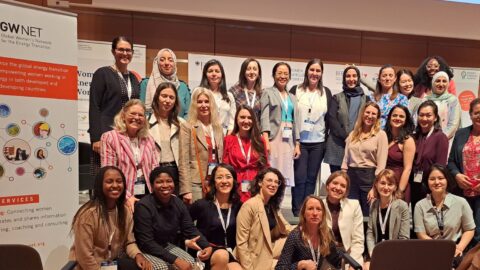GWNET brings you the 4th instalment of the “Meet the Women in Clean Cooking” series which celebrates the work and achievements of the women who are part of the Clean Cooking Mentorship Program. This program is made up of 30 mentee-mentor tandems, with mentees from over 15 countries. Meet Clean Cooking mentee, Brenda Mutalaza, Customer Service & Loans Manager at African Clean Energy in Uganda.
1) Tell us a little about yourself. What do you love most about what you do?
I’m a very simple and passionate young woman who has worked in the clean cooking energy sector for 3 years, a Ugandan by nationality and raised in a small town called Mbale. I love travelling, reading literature, singing and above all, cooking.
Currently, I’m taking on the role of a Customer Service & Loans Manager, in a department responsible for bridging the gap between customers and the company in regards to delivering efficient product information to the customer, bringing feedback from the customers to the company and ensuring that repayments for the stove are done on time. This is the most amazing part of what I do.

2) What were your goals when you started working in clean cooking? How have these evolved?
Firstly, to become more knowledgeable about the clean cooking sector. To a certain extent, I have been successful in this as I have read more about clean cooking, gained access to reports published and blogs written about this sector.
Another goal I had was to build my network. I have been successful in doing this by attending clean cooking summits and presentations where I have met people that are passionate and knowledgeable about clean cooking. I always refer to them when it comes to this sector.
Lastly, I aimed to improve team collaboration and communication. I’ve been able to create new guidelines for my team to follow and also guidance on what to avoid in order to achieve clean cooking goals.
3) What are the opportunities for clean cooking in your country?
The following are the opportunities for clean cooking in Uganda;
- The growing middle class in Uganda, with a high percentage of people able to access clean cooking.
- Increased access to electricity as some of the cookstoves provide lighting as an additional advantage.
- Advanced technology is exhibited in the clean cooking sector.
- Solid evidence that shows that clean cooking improves public health by reducing harmful emissions of particulate matter and black carbon.
- The presence of coordinating associations and funders that support clean cooking activities and promote its awareness.
4) What challenges have you faced in the sector? Can you tell us how you overcame (or are overcoming) this challenge(s)?
The following are the challenges the clean cooking sector is facing and how we are overcoming them;
Firstly, the information barrier is a great challenge. There is a lack of information especially in rural areas as awareness is more concentrated in the urban areas. Currently, government agencies are assisting and advising applicants and potential recipients on how to apply for renewable energy incentives.
Secondly, the clean cooking sector is associated with high costs, for example, expensive cookstoves that make it hard for low-income earners to afford them and thus they aren’t able to join the campaign. The major cause for this is that products are not manufactured locally thus high expenses are incurred during transportation.
Local manufacturing of this equipment would be a great idea to cut down on the costs involved, but also credit purchases can be introduced to ease the acquisition of this equipment.
Alternative fuels and stoves are another challenge, as many modern stoves also face the awareness and affordability challenges associated with higher-end biomass stoves. Added to this are the challenges of fuel switching as households are hesitant to take the risk of relying on a fuel market that may be quite volatile and where they have no experience. Basic accessibility can also be an issue for fuels such as LPG whose distribution networks in rural areas are not well developed.
5) Where would you like to be in 5 years and how can this mentorship program support this long-term goal?
In the next 5 years, I would like to be a great leader who is able to empower other women and effectively perform my duties to cause change.
This mentorship program can support me by offering me support on the various ways to overcome limitations caused by a lack of self-confidence and the fear of making decisions while also enabling me to improve on my planning abilities.
6) What advice would you give to women hoping to join the clean cooking sector?
I would advise women hoping to join the clean cooking sector to take time to do the necessary research and acquaint themselves with information regarding clean cooking as much as they can, such that they have up to date information regarding the sector which guides their decision making.
Additionally, I would advise women to adapt to the growing and advancing technology in the clean cooking sector such that they perform or attend to customer needs as required.
Furthermore, check for the demands that are existing in the market and communities today, and see how clean cooking can solve these problems.
Lastly, be informed of the locality you are living in and determine if the people are able to adjust what they are using right now and adapt to the new changes brought by clean cooking. Also, if you an entrepreneur, determine the availability of the resources that you would need to ensure business continuity.
Read more about GWNET’s mentoring programmes here.











